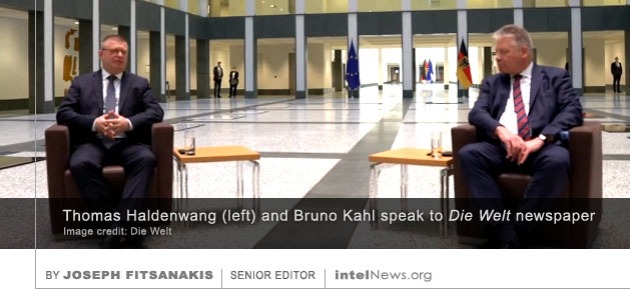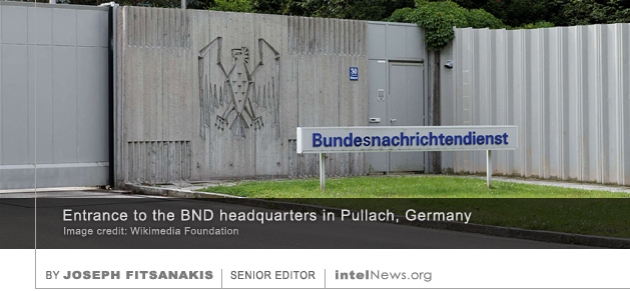Russian spy activity has reached Cold War levels, say Germany’s intelligence chiefs
June 7, 2021 1 Comment

RUSSIAN INTELLIGENCE ACTIVITY in Germany has reached levels not seen since the days of the Cold War, while espionage methods by foreign adversaries are now more brutal and ruthless, according to the country’s spy chiefs. These claims were made by Thomas Haldenwang, who leads Germany’s Agency for the Protection of the Constitution (BfV), and Bruno Kahl, head of the Federal Intelligence Service (BND), which operates externally.
The two men spoke to the Sunday edition of Die Welt, one of Germany’s leading newspapers. Their joint interview was published on June 6. Haldenwang told Die Welt am Sonntag that the presence of Russian spies on German soil reflects Moscow’s “very complex intelligence interest in Germany”. Accordingly, Russia has “increased its [espionage] activities in Germany dramatically” in recent years, said Haldenwang.
The counterintelligence chief added that Russia has a “large number of agents” that are currently active in German soil. Their goal is to try to “establish contacts in the realm of political decision-making”. One of many topics that the Kremlin is intensely interested at the moment is the future of Russia’s energy relationship with Germany, according to Haldenwang.
At the same time, Russia’s espionage methods are becoming “coarser” and the means that it uses to steal secrets “more brutal”, said the spy chief. Kahl, his external-intelligence colleague, agreed and added that Germany’s adversaries are “employing all possible methods […] to stir up dissonance between Western states”. Their ultimate goal is to “secure their own interests”, concluded Kahl.
However, despite Russia’s increased intelligence activity in Germany, the most serious threat to the security and stability of the German state is not Moscow, but domestic rightwing extremism, said Haldenwang. Notably, the German spy chief discussed the unparalleled rise of rightwing rhetoric on social media and websites. Such propaganda is being spread by people that he termed “intellectual arsonists”. Their “hate-filled messages” are essentially anti-democratic, said Haldenwang.
► Author: Joseph Fitsanakis | Date: 07 June 2021 | Permalink
 Germany’s two most senior intelligence officials have dismissed suggestions by European officials and leaders, including the president of France, to create a Europe-wide intelligence agency. The numerous deadly attacks carried out by Islamic State supporters across Europe in recent years have given rise to calls from various quarters for the establishment of a new intelligence service that would combine resources from every member-state of the European Union. Last month, the European Union’s Commissioner for Migration, Home Affairs and Citizenship, Dimitris Avramopoulos,
Germany’s two most senior intelligence officials have dismissed suggestions by European officials and leaders, including the president of France, to create a Europe-wide intelligence agency. The numerous deadly attacks carried out by Islamic State supporters across Europe in recent years have given rise to calls from various quarters for the establishment of a new intelligence service that would combine resources from every member-state of the European Union. Last month, the European Union’s Commissioner for Migration, Home Affairs and Citizenship, Dimitris Avramopoulos,  German intelligence and security agencies have publicly rejected a direct request made by Turkey’s intelligence chief to gather information on Turks who are living in Germany and are critical of the Turkish government. The request reportedly relates to attempts by the Turkish government to round up its critics, following a failed military coup in July of last year. The government of Turkish President Recep Tayyip Erdoğan accuses members of the so-called Gülen movement of orchestrating the coup, which included an armed attack on the country’s parliament and the murder of over 200 people across Turkey. The Gülen movement consists of supporters of Muslim cleric Fethullah Gülen, who runs a global network of schools, charities and businesses from his home in the United States. The government of Turkey has designated Gülen’s group a terrorist organization and claims that its members have stealthily infiltrated state institutions since the 1980s.
German intelligence and security agencies have publicly rejected a direct request made by Turkey’s intelligence chief to gather information on Turks who are living in Germany and are critical of the Turkish government. The request reportedly relates to attempts by the Turkish government to round up its critics, following a failed military coup in July of last year. The government of Turkish President Recep Tayyip Erdoğan accuses members of the so-called Gülen movement of orchestrating the coup, which included an armed attack on the country’s parliament and the murder of over 200 people across Turkey. The Gülen movement consists of supporters of Muslim cleric Fethullah Gülen, who runs a global network of schools, charities and businesses from his home in the United States. The government of Turkey has designated Gülen’s group a terrorist organization and claims that its members have stealthily infiltrated state institutions since the 1980s. The head of Germany’s foreign intelligence agency has been removed from his post in a move described by observers as surprising. Gerhard Schindler, 63, had led Germany’s Federal Intelligence Service, known as Bundesnachrichtendienst, or BND, since 2012. Founded 60 years ago with direct input from the United States Central Intelligence Agency, the BND is today responsible for collecting intelligence abroad in the service of German national interests. Headquartered in the southern German city of Pullach, near Munich, the BND is directly subordinate to the office of German Chancellor Angela Merkel.
The head of Germany’s foreign intelligence agency has been removed from his post in a move described by observers as surprising. Gerhard Schindler, 63, had led Germany’s Federal Intelligence Service, known as Bundesnachrichtendienst, or BND, since 2012. Founded 60 years ago with direct input from the United States Central Intelligence Agency, the BND is today responsible for collecting intelligence abroad in the service of German national interests. Headquartered in the southern German city of Pullach, near Munich, the BND is directly subordinate to the office of German Chancellor Angela Merkel.





